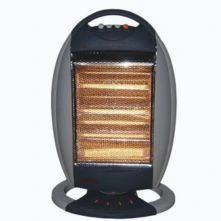Get A Quote
BIS Certification for Room Heaters– IS 302 (Part 2 /Sec 30)

Room
heaters are common household appliances designed to provide warmth in indoor
spaces during cold weather. Due to their exposure to high temperatures and
proximity to flammable materials, these devices must meet strict safety
standards to prevent electrical hazards, overheating, and structural failures.
BIS certification under IS 302 (Part 2/Sec 30) specifies essential safety
guidelines, ensuring room heaters are safe, durable, and efficient for
residential use. Compliance with this BIS standard assures users of reliable
performance and safety for household heating appliances.
Introduction
The
Bureau of Indian Standards (BIS) mandates certification for room heaters under
IS 302 (Part 2/Sec 30), which focuses on essential safety requirements for
heating appliances used in residential and similar environments. This standard
addresses risks associated with electric shock, overheating, and material
resilience. Manufacturers are required to obtain BIS certification, represented
by the ISI mark, to legally market room heaters in India, thereby ensuring
these products meet national safety benchmarks for household appliances.
Why is BIS Certification Necessary for Room
Heaters?
BIS certification for room heaters is critical to ensure consumer safety. As room heaters operate at high temperatures, they pose potential risks such as electric shock, overheating, and fire hazards. BIS certification verifies that the heater meets the safety requirements outlined in IS 302 (Part 2/Sec 30), providing consumers with confidence in the heater’s quality and safety. Certification also enhances product reliability and assures users of the heater’s safe performance in residential settings.
Overview of Indian Standard IS 302 (Part 2/Sec 30)
Indian Standard IS 302 (Part 2/Sec 30) outlines crucial safety requirements for room heaters to ensure safe and reliable operation. The standard emphasizes electrical insulation to protect users from shocks, even during continuous use at high temperatures. It mandates overheating protection to prevent the heater from reaching unsafe temperatures, thus reducing the risk of burns or fire. The use of heat-resistant, durable materials is specified to ensure the longevity of the appliance, while stable heating performance is required to provide consistent warmth without fluctuations. Additionally, the standard requires high-quality heating elements that can endure regular heating cycles without degradation, ensuring both safety and efficiency over time.
Process for BIS Certification
To
achieve BIS certification for room heaters under IS 302 (Part 2/Sec 30),
manufacturers must follow these steps:
- Application Submission: Manufacturers submit the
application form with necessary documents, including technical
specifications and safety features.
- Document Review: BIS reviews the submitted
documentation to ensure compliance with IS 302 (Part 2/Sec 30).
- Factory Inspection: BIS officials conduct an
on-site inspection to assess the production process and verify quality
control measures.
- Sample Testing: Product samples are tested
in BIS-approved laboratories to verify conformity with safety
requirements.
- Certification Grant: Upon successful testing and
inspection, BIS grants certification, allowing the manufacturer to display
the ISI mark on the room heaters.
Documents Required for BIS Certification
Manufacturers
applying for BIS certification for room heaters need to provide the following
documents:
- Application form
- Product specifications and
technical details
- Manufacturing process and
quality control documentation
- Test reports from
BIS-approved laboratories
- Factory layout and equipment
details
- Proof of business
registration
- Declaration of conformity to
IS 302 (Part 2/Sec 30) standards
These documents confirm the manufacturer’s adherence to safety and performance standards required by BIS.
BIS ISI Mark Certification Costing And Timeline
To Know The Process in Detail, Please Visit:
- BIS ISI Mark Certification for Domestic Manufactures
- BIS ISI Mark Certification for Foreign Manufactures
Under BIS Registration Products ISI and CRS
Conclusion
BIS
certification under IS 302 (Part 2/Sec 30) is essential for ensuring the safety
and reliability of room heaters in household environments. By obtaining BIS
certification, manufacturers assure consumers that their room heaters meet
critical safety benchmarks, enhancing product credibility and consumer
confidence. EVTL India offers expert consultancy to streamline the BIS
certification process, assisting manufacturers with documentation, testing, and
compliance requirements. Partnering with EVTL India enables manufacturers to
efficiently navigate certification, ensuring room heaters meet BIS standards
and achieve successful market entry.
Free Call Back
Latest News & Update
📅 BIS Critical Component List (CCL) Updates for Solar PV Modules
🕒 BIS Fee Concessions for MSMEs and Startups | EVTL India
📅 Guidelines for Implementation of Essential Requirements for Security of CCTV
🕒 Omnibus Technical Regulation (OTR) Amendment Order, 2025
🕒 Extension of Timeline for Filing Annual Returns by Battery Producers
📅 Extension of Timeline for Filing Quarterly and Annual Returns for E-Waste
🕒 Extension of Concurrent Running Period for IS 302-1: 2008 and IS 302 (Part 1): 2024
🕒 BIS Guidelines for Grant of Licence (GoL) | EVTL India
📅 CPCB Guidance on filing of Application, Fees and more
🕒 CPCB Notification on Labelling of Plastic Packaging
📅 Mandatory Compliance for Input Materials of Steel and Steel Products for Imports
🕒 BIS Guidelines for Scheme-X Certification for OTR-Regulated Products
📅 BIS Upgrades Product Certification License Numbers to 10-Digit Series
🕒 BIS Certification No Longer Mandatory for 14 Chemical & Polymer Categories
Why Choose EVTL INDIA
Expertise in Indian Regulatory Standards
End-to-End Support
Trusted by Top Indian & Global Brands
Fast Processing & Transparent Pricing
Strong Liaison with Indian Authorities
Company Profile














